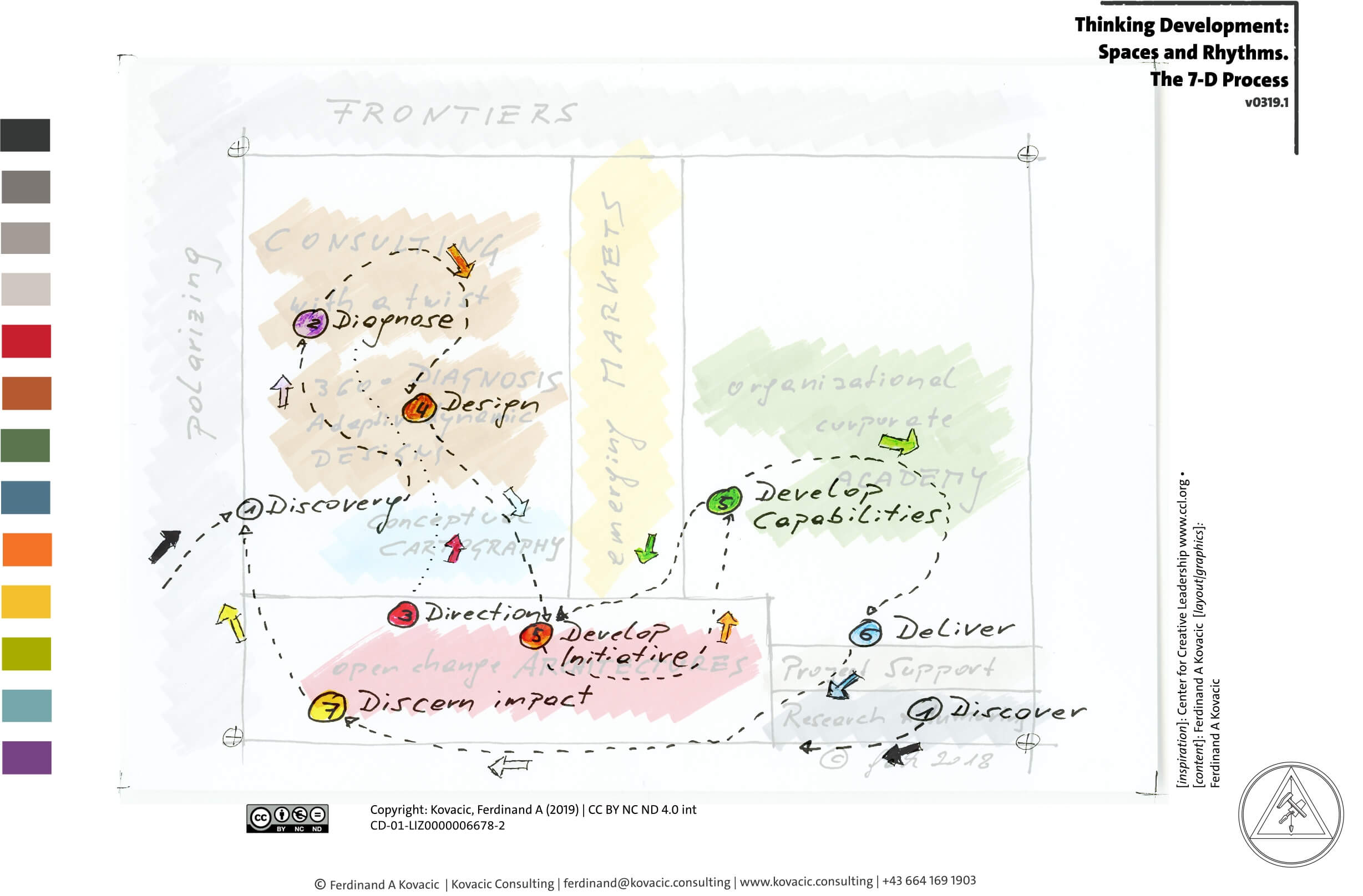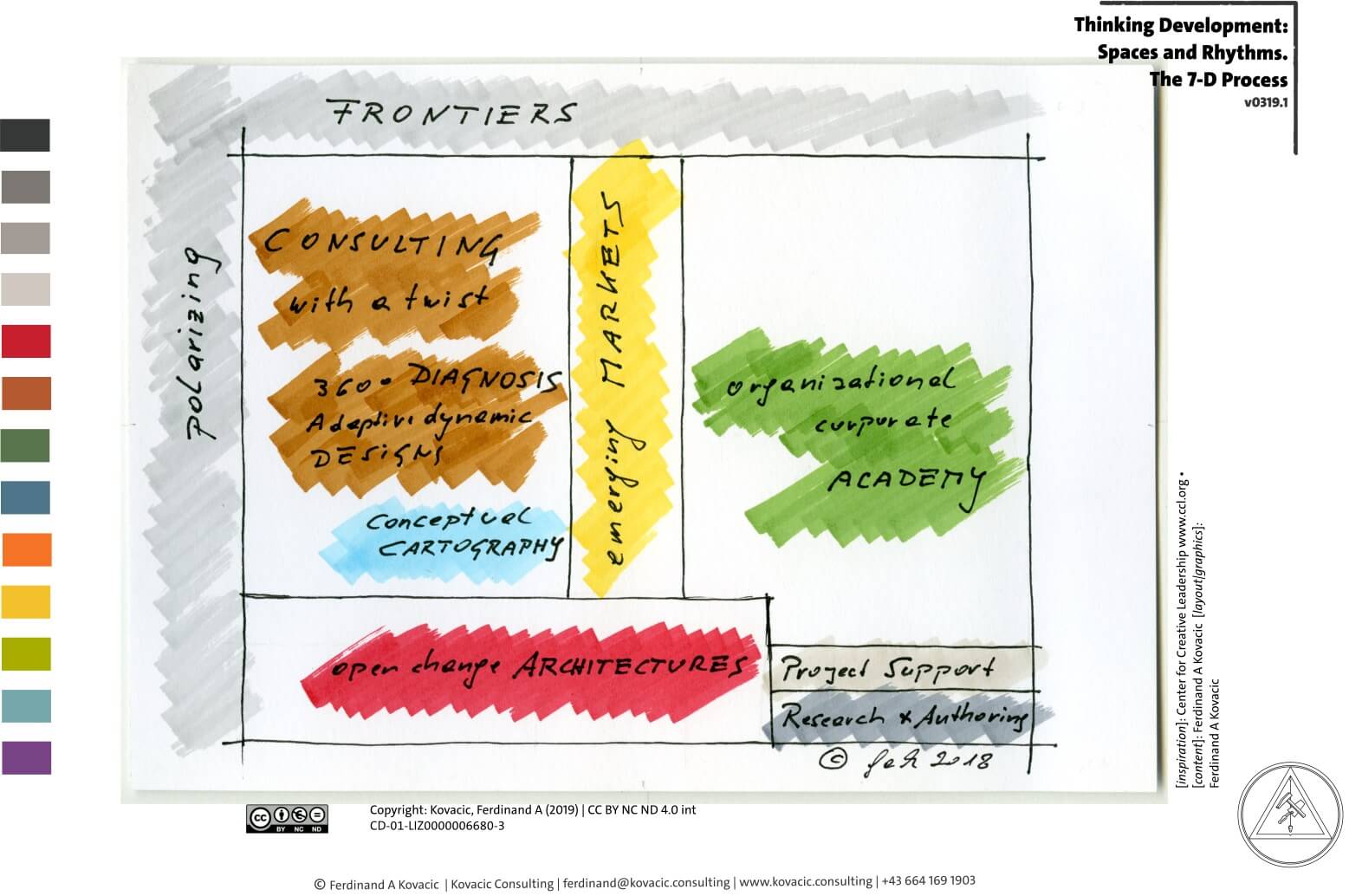Academy
7-D DEVELOPMENT PROCESS
Learning Pathways
Explore the following three DEPOTS—GENERAL Business Skills, GLOBAL Business Skills; and Business FINANCE Skills—by clicking on their respective different subject matter TABS.
1| DEPOT – GENERAL

English-German
For German-speaking regions ♦ Materials and training sessions are available in both English and German (Englisch und Deutsch) ♦ Gain business skills (e.g. finance) while improving workplace English ♦ In collaboration with Young Translations Language Solutions ♦ www.young-translations.com/en/

Frameworks + UBMS
Unified Business Management System [UBMS] by Kovalentics ♦ A practical business management framework ♦ Identification of key factors for managing the internal (company) and navigating the external (competition, markets) environments ♦ 4 Dimensions – 2 Dynamics – 4 Environs – 1 Connector ♦ Three »Orientation Frameworks« are presented on this website …

Context & Complexity
Understand business environments in terms of complexity ♦ Distinguish detail complexity (diversity) and dynamic complexity (volatility or dynamism) ♦ Use suitable frameworks to analyse the impact (e.g., on strategy, or leadership style) …

Thinking in Systems
Differentiate between linear thinking and systems thinking ♦ Identify deeper patterns behind situations (The Systems Thinker) ♦ Defining clear »system boundaries« ♦ Apply Peter Senge′s »systems archetypes« to recognise recurring system behaviors ♦ Use Aswath Damodaran′s Three-Ps continuum: (im)Possible, (im)Plausible and (im)Probable ♦ Practise John Boyds′ OODA Loop: Observe, Orient, Decide, Act …

Adaptive Competencies
Navigate a comprehensive Adaptive Life Cycle framework (Fatz, Dean, Katzmair) ♦ Discover the potential of Ecocycle Planning ♦ Understand resilience as a combination of robustness and adaptability ♦ Learn about key dynamic patterns like megatrends, product life cycle, and the corporate life cycle ♦ Explore ambidexterity in business management—the ability to optimise (exploit) while renewing for the future (explore) …

... and more ...

Strategizing »full 2 lean«
Strategizing »full | lean | agile« ♦ Approaches, methods, tools and road maps ranging from whole-scale to incremental ♦ Right strategies for specific contexts ♦ With a focus on fast, small-scale, iterative and practical direction finding …

Business Model Canvas | Value Proposition Design
Two evergreens worth looking at ♦ Quick tools for fast analysis ♦ Thinking through the key dimensions of a business or social enterprise [BMC] ♦ Delivering value from a customer′s point of view [VPD] ♦ Integrate a Features–Advantages–Benefits [FAB] framework …

Effectuation
An entrepreneurial, resource-focused and super-practical framework ♦ Manage search, change and development processes ♦ For rather uncertain and complex situations when goals are not (yet) clearly known ♦ 4 Principles of Effectuation …

Functional Strategies
Strategies and strategy development for business functions ♦ Alignment with overall company strategies ♦ Navigate the maze of functional and cross-functional themes …

... and more...

Organization Design
An introduction into Applied Organisation Design ♦ Elements and dimensions of OD ♦ On organisational structure, horizontal linkages, business processes, infrastructures, HR and Governance Systems ♦ The concept of Organisational Health ♦ Organisational Fit and Good Design Principles …

Boundary Spanning
The Art of Connecting ♦ Effective collaboration across silos ♦ Identify gaps and build bridges across: vertical, horizontal, stakeholder, geographic or demographic boundaries …

Matrix Management
»Making The Matrix Work« ♦ Collaboration skills for complex organisational structures ♦ With special focus on middle management challenges and capabilities …

Organizational Agility
Concepts and tools to increase self-organisation while maintaining alignment and direction ♦ Scrum, Design Thinking and a diversity of other micro-methods …

... and more ...

Cultures + Identities
About cultures and identities ♦ Why they still matter in business ♦ Descriptive models and cultural dimensions ♦ How cultural assumptions influence strategies, organizations and ideas on leadership ♦ A practical, no–bullshit–approach …

Leadership
Leadership models, dimensions and frameworks ♦ How culture influences our idea of »good leadership« ♦ Identify appropriate and non-manipulative leadership behaviors for and in your organization ♦ A complex and controversial, yet always fun topic …

Enabling Change
A look at the entire spectrum from whole-scale to incremental change ♦ Dimensions, designs, mindsets ♦ Helpful roadmaps ♦ Mindset change through system change: different strategy, different organisation design, different people ♦ Respect for the past, loyalty to places and people ♦ A calm, practical, down-to-earth approach …

... and more ...

People
From recruiting to retention ♦ About talent identification and development ♦ On performance management, succession planning ♦ And such much more: an overview and comprehensive tool kit …

Team Effectiveness
What constitutes an »effective« team? ♦ What are the main dimensions to take care of? ♦ About goals, roles, conflicts, decision taking, collaboration and feedback ♦ Special focus: the challenges of managing remote and international teams …

Meeting Effectiveness
Planning and running better Meetings ♦ Collaboration without waste ♦ From Meeting Manifest to Meeting Canvas and effective actions ♦ With a special focus on the challenges of remote meetings …

Kanban
Enabling personal and professional balance and productivity ♦ An effective process and visualization framework ♦ Gain back and maintain control over competing priorities …

... and more ...

Strategy Execution & Delivery
Making things happen requires linking strategy design with strategy execution ♦ Dimensions and principles ♦ Thinking through and developing a coherent and holistic implementation approach to increase likelihood of success …

PPP Practical Project Management
The many practicalities of Project Management ♦ The basics of PM ♦ Dealing with unclear goals, unrealistic targets, multiple stakeholders, project crises and other obstacles …

General Business Skills
How to systematically develop General Business skills step by step ♦ Understanding the basics of value chains, production processes, corporate functions or general management dimensions ♦ Finance for Non-Financials (see also 3| Depot – Finance) …

Project-based Learning
Mixing Doing and Development ♦ How to integrate project delivery with personal as well as organizational learning ♦ A small investment with material long-term benefits …

... and more ...

The Embedded Economy
Economy as an “embedded” concept ♦ Ecological ceilings, social foundations and their indicators ♦ The art of drawing “systems boundaries” ♦ Sustainable Development Goals (SDGs) ♦ The Circular Economy concept …

TESEI Total Economic, Societal and Ecological Impact
A comprehensive look at Total Economic, Societal and Ecological Impact [TESEI] ♦ The meaning of “well-being” ♦ A simplified yet utterly practical framework ♦ Ethics + Aesthetics for a safe, prosperous and sustainable future …

... and more...
Copyright: Kovacic, Ferdinand A (2019–2025) | CC BY NC SA 4.0 int | Workcode CD-01-LIZ0000007253-7 | Icons: Noun Project
2| DEPOT – GLOBAL

Globalisation
International business environments and “The New Normal” ♦ The Triad of globalisation, digitalisation and politicisation ♦ Economic, business and political shifts ♦ Connectography and Globaloney ♦ Key strategy topics in internationalisation ♦ Shocks, megatrends and dealing with complexities …

Institutional Environments
Expect and understand institutional and organisational differences ♦ Liberal versus Coordinated Market Economies. Or rentier systems and neo-patrimonialism ♦ Models of organisations: stakeholders, power, decision making, property rights …

Political Risk and Mitigation
A systematic look at sources, types and the nature of political risks ♦ At the local, regional and geo-political level ♦ Proactive mitigation and negotiation strategies ♦ Non-Market engagements, honest corporate citizenship, and shared value approaches …

... and more ...

Country-level Analysis
Analysis of a potential target country in which to operate ♦ Market research and market entry preparations ♦ Use of practical yet systematic analysis frameworks ♦ Identification of valuable information and research sources ♦ From research to networks to exploration | learning journeys ♦ A sober look at country-related risks …

Industry-level Analysis
An in-depth look at the competitive landscape of local and peer competitors ♦ Match value offer and competitive sensitivities in different industries ♦ From a cultural, administrative, geographic or economic perspective ♦ Incumbents versus international competitors: (dis)advantages of global competitors …

Firm-level Analysis
How to compete and add value ♦ Use a strength-based view on firm-specific resources, capabilities and core competencies ♦ How to apply adaptation, aggregation and arbitrage strategies ♦ Determine the organisation′s globalization readiness ♦ Right-sizing internal company expectations …

Portfolio Matching
Match country and market with the firm’s/organization’s value offer ♦ Achieve scale and relevance ♦ Market attractiveness and prioritization analysis ♦ Geographies and value offer portfolios clusters ♦ Determining the overall risk portfolio …

... and more ...

Organisation Designs
Organisation design for Emerging Markets ♦ Moving beyond structures ♦ Design and manage internal as well as external connectivities ♦ Functional area strategies and operations for global markets ♦ Role of the (regional) headquarter ♦ Effective set-up and use of Shared Service Centers ♦ Organising for and around volatilities …

Route-to-Market
Planning your local presence ♦ Analysing local structures and dynamics ♦ Developing EM Sales and Channel Management strategies ♦ Taking a patient, long-term life cycle view ♦ Assessing affordable investments and macro-micro risks ♦ Maintaining your brand, quality and reputational control …

Distributor Management | Focus EM
Selecting and recruiting of distributors ♦ Thoughtful designs of distributor’s functionalities ♦ Life-time cycle management ♦ Building and maintaining operational effectiveness ♦ Developing appropriate monitoring and control processes ♦ Establishing mutual/reverse training and communication processes ♦ Understanding and agreeing on pricing and margin management …

Supply Chain Management
Understand Emerging Market Supply Chain [SCM] characteristics ♦ Develop SCM orchestration ♦ Match innovation, business and supply chain strategies ♦ Build long-term strategic supply chain resilience ♦ Assure operational effectiveness along internal and external supply chain nodes ♦ Integrate and train external partners …

... and more ...

Global Cultures
Managing across cultures and distances ♦ Identify social and cultural identities: “ideas of man and nature” ♦ Describing cultural environments: descriptive models, cultural dimensions, global environments and culture clusters ♦ The workplace as culture stomping ground: on strategy, leadership, decision finding and organizing ♦ Versatility requirements and communication skills …

Leadership in a Global Context
A look at leadership in the international context ♦ Conventional notions of leadership and management ♦ Leadership as a cultural and context-dependent phenomenon ♦ Institutional and organizational environments and their potential impacts ♦ The GLOBE Study ♦ The art of boundary-spanning across leadership expectations …

... and more ...

HR Capabilities | Talent
People development as “talent at all levels” ♦ Combine proactive, long-term strategic processes and designs with practical, on the spot development interventions ♦ Assure balance in top management team diversity ♦ Build vocational, business and managerial | leadership skills for front-line workers and supervisors ♦ Grow skills and talent from within, at home, abroad and with key partners ♦ Foster appropriate—not woke—diversity and inclusion …

Managing Global Teams
Understand advantages and special challenges of working across distances, cultures and countries ♦ Build and lead global and dispersed teams ♦ Leadership versatility in a global context ♦ How to manage communication and maintain trust ♦ Remote project management ♦ Technology as enabler—and its limits …

Corporate | Organizational Academy
You got that far? Fantastic ♦ What do you think of it? Interested? ♦ For business propositions | inputs | exchange of ideas | co-operations | pro bono please get in contact with me …

... and more ...

Frugal | Innovation
A practical look at innovation leverage points: create or redesign products + services for local needs ♦ Adjust the business model to local environments ♦ Cost containment ♦ Thoughtful integration of new technologies ♦ With a special focus on “frugal innovation” to serve the poor and emerging middle class people in Emerging and Developing Countries ♦ TRUE Inclusion Investing …

... and more ...

Factfulness | Life on Four Income Levels
Study and learn from Hans Rosling′s great book »Factfulness« ♦ The Gapminder project [www.gapminder.org] ♦ The concept of Life on Four Income Levels ♦ Tame dramatic instincts and overdramatic worldviews ♦ Dramatic instincts: gap | negativity | straight line | fear | size | generalization | destiny | single perspective | blame | urgency ♦ Get the book and study the website …

... and more ...
Copyright: Kovacic, Ferdinand A (2019–2025) | CC BY NC SA 4.0 int | Workcode CD-01-LIZ0000007253-7 | Icons: Noun Project
3| DEPOT – FINANCE

Business Finance Framework
Explore company finances through graphical visualisations ♦ Work with digital and physical/analogue versions and with varying levels of complexity ♦ Dive into the topic of “financial viability” of a business from a high-level perspective ♦ Grasp key business finance concepts in a hands-on way ♦ Connect the dots between business and finance …

Practical Business Finance
Master the basics of business finance ♦ Navigate through its myths and “jargon jungle” ♦ Analyze financial reports to assess the financial health and viability of a business ♦ Understand the three core financial statements: Income Statement, Balance Sheet and Cash Flow Statement ♦ Explore key elements from (sales) revenues to net income ♦ Focus on essential finance/accounting concepts that really matter in business practice …

Finance & Business Model Narratives
Understand your company′s business and operating model ♦ Uncover its business story through history, markets, and competitors ♦ Dive into annual reports, financial statements and, forecasts ♦ Utilize external industry insight ♦ Align business model and financial data to shape a cohesive narrative …

Portfolio Optimization
Streamline your product and service portfolio ♦ Organise meaningful product and service groupings ♦ Define key parameters for future relevance ♦ Evaluate using targeted criteria ♦ Assess the financial impact ♦ Decide on actions: start–stop–continue …

Pricing Waterfall
Visualize and analyze pricing from “base price” to “pocket price” and “pocket margin” ♦ Break-down key components like on-invoice discounts, off-invoice adjustments, cost-to-serve and other costs ♦ Identify and address price “leakages” to boost profitability ♦ Leverage a tailor-made framework blending the traditional pricing waterfall concept with a modern strategic pricing design …

Mechanics of Pricing
Master the “mechanics of pricing” ♦ Evaluate how price changes affect profitability based on contribution margins and cost of goods sold ♦ Simulate pricing scenarios to make data-driven decisions for your business ♦ Optimize pricing strategies to optimise the impact on sales and profitability growth …
Copyright: Kovacic, Ferdinand A (2024) | CC BY NC SA 4.0 int | Icons: Noun Project
“Let it not be said that I have said nothing new: the arrangement of the material is new.” Blaise Pascal


